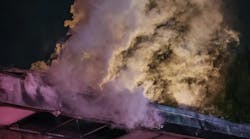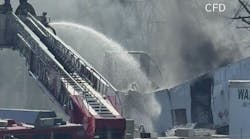The next rule is perhaps the simplest to understand and you have heard it many times and from many different folks throughout your life: Tell the entire truth the first time and every time that you are asked. Understanding that our most precious resource is our people and that our people are human, the possibility does exist for deception, so it makes sense to talk about it in the rules. It seems like quite the irony that the folks that Americans trust the most, firefighters and paramedics, can sometimes withhold information, mislead or otherwise not be truthful in the workplace.
To capture and maintain the public's trust is one of the most important functions that a fire department can perform. To perform our jobs properly, the public must have a high degree of trust in every aspect of our job. Considering that a firefighter has more position authority than does a police officer, it is clear that we must maintain and protect the public's trust.
In our nation today, firefighters from coast to coast will enter homes without search warrants to handle a wide variety of fire and medical emergencies. Paramedics will be required to cut away clothing on unconscious and unresponsive patients to perform required and needed emergency medical services care. Many of these folks in distress will not be accompanied, so their fate (health and safety) is in our hands. These mission-critical tasks can be performed only if the level of public trust is high enough, in your city and mine, to support the performance of your jobs.
One way that we can help to ensure that we have the faith, trust and support of the public is to simply be truthful with them all of the time. During one of the previous presidential administrations, the phrase was used that "the best disinfectant is sunlight." The meaning of this metaphor is that whatever action a public person or agency is taking should be completed in a way that everyone can see all of the elements of the process and there are no surprises for anyone, especially the public. Once the public trust is called into question, it is difficult to impossible for the agency to reclaim the position and status that it once enjoyed.
A major component of this process is for our members to believe in a core value and for the executives of the department to possess is "telling the truth, the whole truth and telling it the first time." Without fail, we all will be guilty of making mistakes from time to time. That is part of the human nature of being mortal. In fact, the philosopher Cicero in 43 B.C. wrote that "to err is human," so we have been making honest mistakes for a long, long time. Where the train jumps the tracks and the trust in the department slips is when we try to cover up or hide a mistake. Nothing could hurt your organization's reputation and standing in the community more than to have willfully mislead the public that you are sworn to serve and protect.
Most folks understand that honest mistakes will be made from time to time by nearly everyone. The best action that can be taken in this difficult situation is to acknowledge the mistake, investigate why it happened and put controls into effect that will at least likely eliminate or avoid the mistake in the future. First, if you don't acknowledge that a mistake was made, there is very little hope that corrective and preventative action can be implemented. Next, any action that tries to minimize or redirect the blame is a step that will be clear to all and seen as a hollow attempt to resolve the issue. Finally, deliberately misleading or misguiding the public on a topic will come with great organizational danger and consequences.
Understanding modern-day communications and investigation techniques, it is very unlikely that a significant issue can be kept secret for a long time anyway. So, take your medicine on the front end of a problem or issue by getting out in front of it early and being honest. It is amazing how effective you will become at protecting the public trust that your agency desperately needs and the issue will get smaller over time instead of becoming larger. People can accept mistakes; by and large, they will not tolerate liars.
Sometimes, the issue at hand is a simple personnel-related problem, such as arriving to work late. Most every firefighter would relate to this situation occurring and can likely describe some personal event that caused him or her to miss the start of "line-up" (shift change). No one likes to be in trouble or embarrassed in the workplace, so it is understandable why a person may think that manufacturing a story to save face is a good alternative to a bad situation. However, don't take that path! You will regret it in the long run and risk a much more severe penalty when the truth surfaces. The truth always seems to come out eventually and lies are very difficult to remember. In most outfits, coming to work late a time or two means a written reprimand or short-term suspension - not a pleasant experience, no doubt, but survivable. The best advice that I can give you is to "Firefighter Up" by admitting the mistake and taking the consequences that you have earned. And, of course, don't be late to work anymore (change the poor behavior)!
On many occasions, folks have tried to "sharp shoot" the system and lie their way through an issue. The end result typically seems to be a much worse punishment and a lack of trust directed toward the member in question moving forward. In fact, some agencies have rules that require/grounds for termination for the act of lying (lack of candor) or misleading an official investigating in any way.
The ability to simply tell the truth is instilled into all of us. If your practice is to always follow this rule, your life will be a lot simpler and your organization will be able to capture and maintain the public's trust in everything that you do. Once a person goes down the path of deceit, it is tough to recover from and almost always makes a bad situation much worse.
DENNIS L. RUBIN, a Firehouse® contributing editor, is chief of the District of Columbia Fire and Emergency Medical Services Department. Previously, Rubin was chief of the Atlanta, GA, Fire and Rescue Department. He holds a bachelor of science degree in fire administration from the University of Maryland and an associate in applied science degree in fire science management from Northern Virginia Community College, and is enrolled in the Fire and Emergency Management Administration program at the graduate school of Oklahoma State University. Rubin is a graduate of the National Fire Academy's Executive Fire Officers Program, is a Certified Emergency Manager (CEM) and has obtained the Chief Fire Officer (CFO) designation from the International Association of Fire Chiefs (IAFC). He is an adjunct faculty member of the National Fire Academy author of the book Rube's Rules for Survival.





